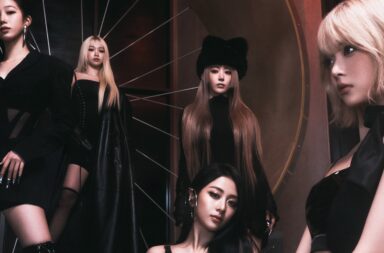
Despite debuting just under two years ago, Aespa have already made quite the name for themselves. Earlier this year, the SM Entertainment girl group took to the stage at Coachella, and just recently made an appearance at the United Nations. They also have one of the most interesting concepts (and sounds) in K-pop, as the four members have virtual avatar counterparts, known as “æs,” that exist in a world called Kwangya. Their music follows suit, with futuristic and synth-heavy sounds that have already propelled them to quick stardom with viral title tracks like “Next Level” and “Savage.”
On their latest album and second EP, Girls, Aespa prove that the unconventional and offbeat formula they engineered with their previous hits does indeed have lasting power, but Girls hints at recognizing that that structure may not work its magic forever. To that end, the quartet also makes an effort to showcase their softer, sweeter side, especially amongst newer b-sides, to show that songs like “Next Level” and “Savage” aren’t where their strengths end.
Even as Girls as a whole brings a bit of newness to Aespa’s sound, the EP kicks off with its most Aespa-like numbers, “Girls,” the title track, and “Illusion,” one of the EP’s pre-release singles. “Girls” is an expectedly unexpected title track, repurposing much of the same structure used in “Savage” especially. While “Girls” does much of what “Savage” gets right, including using earwormy, revving synths only this time meshed with a heavy rock guitar, its repetition of that recipe is also what causes it to fall flat. “Girls” is also without any real vocal hook, as in “Savage,” or addictive, memorable lyrics, as with “Next Level.” “We them girls,” the lyric repeated at the end of the track’s chorus, has some level of catchiness to it, but nowhere nearly as much as the choruses in the group’s previously released titles.
“Illusion” is also quite similar to “Girls” in its utilization of hollow, electronic blips and beeps and vibrating bass synths as its backing instrumentals. However, when taken together with its trap-like beat, it opts for a more unassuming vibe with a melody that slowly creeps into memory. Despite its more lowkey vibe and straightforward structure, as opposed to “Girls,” “Illusion” still feels like total Aespa canon, only more mature. Ningning and Winter’s powerful yet sweet vocals add necessary color to the track’s modest nature, giving it the “oomph” it needs to stand out amongst the rest of the EP.
Even as the EP’s first two tracks are the most eccentric, it’s its softer b-sides that stand out even more, even if they’re less of a statement on their own. “Life’s Too Short,” which appears on the album both in Korean and in an all-English version, is one of those tracks, along with the sweetly subdued acoustic track “ICU.” On their own, both tracks are fairly standard pop b-sides — which aren’t the most expected from a group like Aespa. “Life’s Too Short” and “ICU” are both upbeat but subtle guitar-led tracks that may come across as bland or boring if they were performed by other acts, but they actually only add to Aespa’s intrigue considering they haven’t released music like this before. And though neither touch on the group’s mysterious lore, both tracks prove the group has a little something for everyone and isn’t one to stick to their old tricks.
“Lingo” luckily adds more of a curveball to this similar touch of slight bubblegum poppiness, only with a Western twist that kicks in about midway through the track. The song, which includes cheeky commentary on the various “lingo” involved in Aespa’s lore (“Hey, I think they wanna talk to us/Should we let them join?/Nah, they don’t understand our lingo”), blends a country harmonica instrumental with electronic synths. The track is still upbeat but soft in nature, much like the album’s other two new b-sides, making for a different but still equally-as-welcome approach to the group’s typical sound.
While the new tracks on the album take a subtle but much-needed approach to diversifying Aespa’s small but mighty discography, it still holds onto a lot of the old, and perhaps unnecessarily so. Previously-released singles, including remakes “Forever” and “Dreams Come True,” as well as the group’s debut title “Black Mamba” also unexpectedly find their place on an album, albeit in an extraneous fashion. The final three tracks would’ve likely been better off continuing to exist on their own single albums, although their inclusion doesn’t fully detract from the rest of Girl’s offerings.

All in all, Aespa’s Girls is a step in the right direction. As they’ve nearly mastered their craft so early on in their career of putting out title tracks with glowingly earwormy curveballs, it was time for the group to prove what else they have up their sleeve aside from their expected tricks — and Girls mostly delivers on that front. Considering the album showcases two vastly different sides to the group, the question still remains as to where they’re headed next, Kwangya aside.



